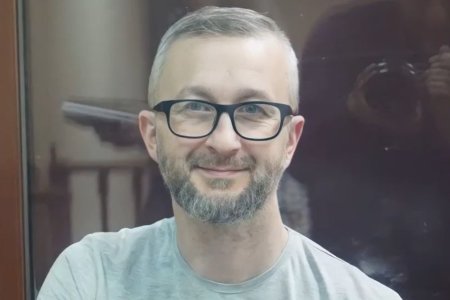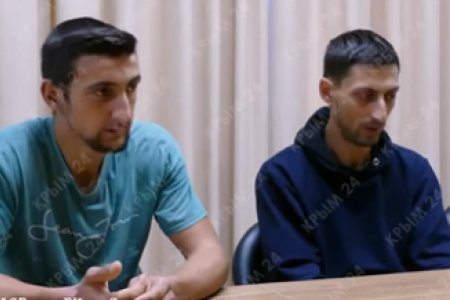
Russia’s supreme court has rejected the cassation appeal brought by Asan Akhtemov and his cousin, Aziz Akhtemov against huge sentences passed in one of Russia’s most brazen uses of the courts for political revenge. Such an outcome was anticipated, but only because the two Crimean Tatars are political prisoners, and it is vital that the names of the ‘judges’ in this case, like all those players involved in Russia’s attack on Mejlis leader Nariman Dzhelyal and the two Akhtemovs be named, and, at the very least, placed under international sanctions.
The hearing at the Russian supreme court’s cassation chamber was held on 21 November before ‘judges’ Alexei Karlin, Dmitry Saburov and Igor Taratuta. Both Asan and Aziz Akhtemov were forced to participate by video link from the Russian prisons where they are being held. The cassation appeal had been filed with respect to all three political prisoners, including Nariman Dzhelyal, and the court appears to have pretended to be unaware why the latter was not present. Dzhelyal, who was the key target of the politically motivated persecution of the three men, was released in an exchange of prisoners on 28 June 2024, and is now actively working to secure the release of all Crimean Tatar and other Ukrainian political prisoners, including the Akhtemovs. He told Graty that he had hoped to the last that Asan and Aziz would be released with him and confirmed that he had heard nothing from the court. Nor, indeed, could he have, as the prison administration who were informed of the hearing would have had no means of contacting him, even had they wished to do so. In fact, the comedy played out regarding Dzhelyal’s ‘absence’ was as much pretence as everything else about this case, from the abductions claimed to be arrests to the final charges concocted against the three men and the sentences.
In reporting the outcome of the hearing, Crimean Process noted that their analysis of the proceedings had identified at least fifteen violations of fundamental standards of access to a fair trial. Most, it should be said, are seen in essentially all cases of political persecution in occupied Crimea, including court bias, obstruction of the defence, especially with respect to the questioning of so-called ‘secret witnesses’, and the failure to react to serious allegations of torture. All such violations, most of which were pointed out by the defence, should, nonetheless, have been taken into consideration by the cassation chamber. Instead, Alexei Karlin, Dmitry Saburov and Igor Taratuta chose to play their role in this travesty and upheld the 15-year sentence against Asan Akhtemov and 13-year sentence against Aziz Akhtemov.
Unconcealed reprisals
The sentences against Asan and Aziz Akhtemov, both of whom are married with young children, are especially brutal given that Moscow never particularly concealed the fact that the supposed ‘saboteur trial’ was an act of reprisal against Nariman Dzhelyal (b. 1980), journalist, civic activist and the first Deputy Chair of the Crimean Tatar Mejlis for his participation in the inaugural meeting of the international Crimea Platform on 23 August 2021. Moscow could not punish the high-ranking representatives of 45 countries who took part in the meeting, but could, and did, come for Dzhelyal, just ten days after the meeting.
Implausible ‘sabotage’
The timing and the absurdity of ‘saboteur’ charges against an internationally respected public figure were further exacerbated by the fact that the alleged act of sabotage’ to a gas pipe near Perevalne took place on 23 August 2021, the day of the Crimea Platform meeting in Kyiv. There appears to have been some minor damage to a gas pipe in Perevalne, with the initial criminal investigation launched being under Article 167 § 2 of Russia’s criminal code (‘deliberate destruction or damage to property’. There was no further mention of this damage, and to this day no photos, etc. have been made public. The gas pipe in question was not on any central circuit and could be fixed relatively easily, and painlessly, given that any disruption to gas supplies was in summer.
Despite all of the above, the FSB first seized five Crimean Tatars and then came up with the claim that there had been an act of ‘sabotage’ which had been planned by Ukraine’s Military Intelligence together with the Mejlis.
Enforced disappearances
Dzhelyal was the last of five Crimean Tatars to be essentially abducted from their homes after armed raids on 3 and 4 September 2021. Civic journalist Asan Akhtemov (b. 1989) and his cousin, Aziz Akhtemov (b. 1996) were seized during the night from 3-4 September. Both were held incommunicado and prevented from seeing independent lawyers until the European Court of Human Rights [ECHR] intervened almost ten days later. The two men immediately retracted their ‘confessions’ and gave shocking accounts of the torture used to obtain this. As well as electric shocks and other physical torture, the FSB had also threatened reprisals against the men’s families.
Both Eldar Odamanov, who had disappeared after the armed search of his home earlier on 3 September, and Shevket Useinov, seized during the following night, were held incommunicado until 5 September. They were then jailed for 10 and 15 days on absurd charges, quite unrelated to the armed raids on their homes. As feared, the two latter men had been forced into ‘testifying’ against Dzhelyal and the Akhtemovs. During the men’s trial, however, both men described the illegal methods of duress that the FSB had used to obtain such ‘testimony’.
All of this was ignored by successive Russian occupation or Russian ‘courts’.
Fabricated ‘evidence’
No evidence
The indictment was based solely upon the above-mentioned ‘testimony’ that the men have all said was extracted through torture, with the first of many increases to the charges coming immediately after the Akhtemovs ignored an open threat from the FSB and retracted their supposed ‘confessions’. As well as confirmation in court from both Odamanov and Useinov, that they had been placed under duress, there had also previously been public statements from two Crimean Tatars who found the courage to refuse to collaborate with the FSB and provide false testimony.
The men were all accused of carrying out an act of sabotage as part of an organized group (Article 281 § 2a), and of the illegal purchase, transfer or possession of explosives as part of an organized group (Article 222.1 § 4). On 8 November 2021, an additional charge was added, of smuggling an explosive device, as part of an organized group (Article 226.1 § 1); and of ‘causing considerable material damage to the Crimean gas network (to the tune of around 1,425 USD). It was even claimed that the minor damage to an obscure gas pipe constituted “an attack on the Russian Federation’s defence capabilities”.
There were also three ‘secret witnesses’, whose ‘testimony’ could not be verified. As in all such cases, no grounds were provided to justify anonymity, yet the ‘court’ not only allowed it, but also obstructed the defence from demonstrating the flaws in the supposed testimony (details here).
‘Trial’
On 21 September 2022, ‘judges’ Viktor Ivanovich Zinkov; Aleksei Viktorovich Kozyrev and Sergei Nikolaevich Pohrehniak from the Russian occupation ‘Crimean high court’ sentenced Nariman Dzhelyal to 17 years’ imprisonment; Asan Akhtemov – to 15 years; and Aziz Akhtemov to 13 years, with all in harsh-regime prison colonies. Steep fines were also imposed: 700 thousand roubles (around 9 thousand euros) in Nariman’s case, 500 thousand roubles against Asan and Aziz Akhtemov. The sentence against Dzhelyal was two years longer than that demanded by ‘prosecutor’ Roman Lobov and Anastasia Supriaga.
Both Zinkov (the presiding ‘judge’) and Pohrehniak betrayed their oath of allegiance to Ukraine, with the latter’s Crimean prosecutor having initiated charges against them of state treason.
On 28 July 2023, ‘judges’ – Yelena Urod (presiding); German Aleksandrov and Ilona Stohniy from the Third court of appeal in Sochi essentially increased the charges against the three political prisoners. While the size of the overall sentences remained the same, the first three years of each sentence was to be in a prison, the worst of Russia’s penal institutions.
Deportation to Russian prisons
All three political prisoners were taken to Russian in October 2023, and sent to different prisons. Nariman Dzhelyal was held in Minusinsk, Krasnoyarsk Krai; Asan Akhtemov – in the Vladimir prison; and Aziz Akhtemov – in Yeniseisk, Krasnoyarsk Krai
Asan’s term in the Vladimir prison ends on 21 December 2024. There is, typically, no information as to where he will be moved, with such moves taking a month or longer. After over three years in Russian captivity, Asan’s health has deteriorated dramatically, with his eyesight failing as a result of the poor lighting and a number of ongoing conditions.
Aziz was moved from Yeniseisk to Rubtsovo in the Yurals in November 2024, with the always arduous journey between prisons made quite unnecessarily long. The conditions during such transfers are particularly bad, and political prisoners are at greater risk as they are deprived of any contact with their families and lawyers. The prison colony is 4.5 thousand kilometres from his family and home in Crimea, with this making the journey for his wife and children both prohibitively expensive and gruellingly long. During his last phone call from the prison colony, Aziz spoke of the bad conditions, as well as the fact that he is the only Crimean Tatar. His wife Adile told Graty that it was clear from her husband’s voice how upset he was.
Please help to provide publicity about this horrific travesty of justice. Publicity was almost certainly instrumental in securing the release of Nariman Dzhelyal. Asan Akhtemov and his two small children, Aziz Akhtemov and his small daughter now also need our voices.


